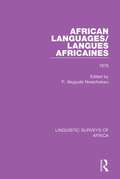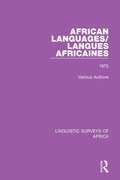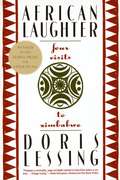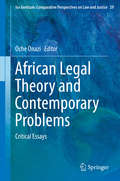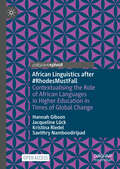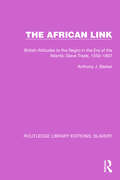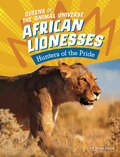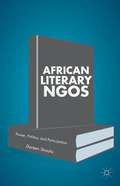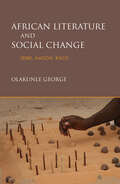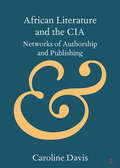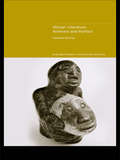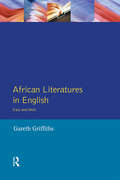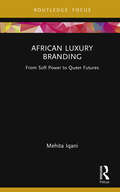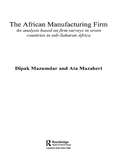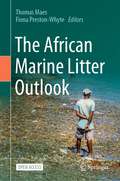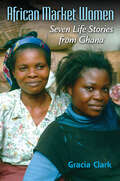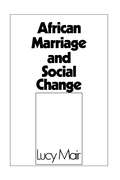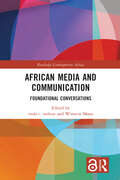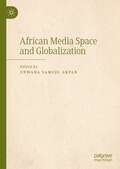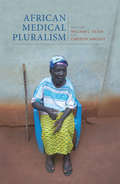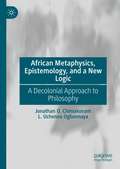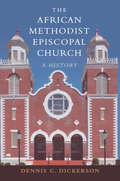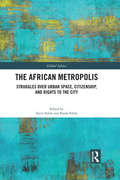- Table View
- List View
African Languages/Langues Africaines: Volume 2 1976 (Linguistic Surveys of Africa #24)
by P. AkỤjỤobi NwachukwuVolume 2 of African Languages includes articles originally published in 1976, written in French and English on educational, literary, cultural, historical and socio-linguistic aspects of language in Africa, as well as descriptive and comparative studies. Among others there are chapters on an early Vai manuscript from Liberia, John Clarke's unidentified Nago dialect and swahili secondary education in Tanzania.
African Languages/Langues Africaines: Volume 1 1975 (Linguistic Surveys of Africa #23)
by Various AuthorsVolume 1 of African Languages include articles originally published in 1975 and written in French and English on educational, literary, cultural, historical and socio-linguistic aspects of language in Africa, as well as descriptive and comparative studies. Among others there are chapters on African oral literature, the standardization of languages and education in Nigeria and a description of Shona spelling.
African Laughter
by Doris LessingA highly personal story of the eminent British writer returning to her African roots that is "brilliant . . . [and] captures the contradictions of a young country."--New York Times Book Review
African Legal Theory and Contemporary Problems: Critical Essays (Ius Gentium: Comparative Perspectives on Law and Justice #29)
by Oche OnaziThe book is a collection of essays, which aim to situate African legal theory in the context of the myriad of contemporary global challenges; from the prevalence of war to the misery of poverty and disease to the crises of the environment. Apart from being problems that have an indelible African mark on them, a common theme that runs throughout the essays in this book is that African legal theory has been excluded, under-explored or under-theorised in the search for solutions to such contemporary problems. The essays make a modest attempt to reverse this trend. The contributors investigate and introduce readers to the key issues, questions, concepts, impulses and problems that underpin the idea of African legal theory. They outline the potential offered by African legal theory and open up its key concepts and impulses for critical scrutiny. This is done in order to develop a better understanding of the extent to which African legal theory can contribute to discourses seeking to address some of the challenges that confront African and non-African societies alike.
African Linguistics after #RhodesMustFall: Contextualising the Role of African Languages in Higher Education in Times of Global Change
by Hannah Gibson Jacqueline Lück Kristina Riedel Savithry NamboodiripadThis open access book explores the link between African languages, decolonisation and transformation. It has its origins in a survey of students and instructors at higher education institutions both inside and outside Africa, and takes as a starting point the 2015 student-led #RhodesMustFall movement which spread across universities in South Africa. Many of the questions being asked by #RhodesMustFall found parallels in ongoing discussions across in Europe and North America. This book presents findings from the survey, set against the broader backdrop of calls for decolonisation and transformation, drawing specifically on linguistics teaching, scholarship and research. The findings provide new insights into how African languages and linguistics are framed and engaged with, amidst decolonial struggles in higher education. This book will be relevant to readers with an interest in African languages, social justice, higher education, and decolonisation.
The African Link: The African Link: British Attitudes in the Era of the Atlantic Slave Trade, 1550–1807 (Routledge Library Editions: Slavery #1)
by Anthony J. BarkerThe African Link, first published in 1978, breaks new ground in the studies of pre-19th century racial prejudice by emphasizing the importance of the West African end of the slave trade. For the British, the important African link was the commercial one which brought slave traders into contact with the peoples of West Africa. Far from remaining covert, their experiences were reflected in a vast array of scholarly, educational, popular and polemical writing. The picture of Black Africa that emerges from these writings is scarcely favourable – yet through the hostility of traders and moralising editors appear glimpses of respect and admiration for African humanity, skills and artefacts. The crudest generalisations about Black Africa are revealed as the inventions of credulous medieval geographers and of the late 18th century pro-slavery lobby. The author combines the more matter-of-fact reports of the intervening centuries with analysis of 17th and 18th century social and scientific theories to fill a considerable gap in the history of racial attitudes.
African Lionesses: Hunters Of The Pride (Queens Of The Animal Universe Ser.)
by Jaclyn JaycoxLions are called “king of beasts.” But a pride is made of mainly females. These mighty beasts hunt and bring back food for the whole pride. The group also depends on the females to care for young. Take a close look at African lions and the important roles lionesses play to ensure a pride’s survival.
African Literary NGOs: Power, Politics, and Participation
by Doreen StauhsProposing the novel concept of the "literary NGO," this study combines interviews with contemporary East African writers with an analysis of their professional activities and the cultural funding sector to make an original contribution to African literary criticism and cultural studies.
African Literature and Social Change: Tribe, Nation, Race
by Olakunle George“George rethinks the entirety of African literature by considering texts from the 19th century and mid-20th century alongside canonical texts.” —Neil ten Kortenaar, author of Debt, Law, RealismAlert to the ways in which critical theory and imaginative literature can enrich each other, African Literature and Social Change reframes the ongoing project of African literature. Concentrating on texts that are not usually considered together—writings by little-known black missionaries, so called “black whitemen,” and better-known 20th century intellectuals and creative writers—Olakunle George shows the ways in which these writings have addressed notions of ethnicity, nation, and race and how the debates need to be rehistoricized today. George presents Africa as a site of complex desires and contradictions, refashioning the way African literature is positioned within current discussions of globalism, diaspora, and postcolonialism.“A bold exploration of the complexity of different modes of writing about Africa in the context of current debates on the nature of the literary in the production of African knowledge. Concerned with a rhetoric of self-writing as it has developed over two hundred years, Olakunle George attends to local details within the larger configurations of colonial discourse in this ambitious and timely work. It is a caution against the neglect of the conditions of possibility that made an African literature possible.” —Simon Gikandi, author of Slavery and the Culture of Taste“A new and welcome addition to the field of African literary studies, Olakunle George’s African Literature and Social Change is dense where it needs to be and glories in productive close readings when its objects call for it.” —Comparative Literature Studies
African Literature and the CIA: Networks of Authorship and Publishing (Elements in Publishing and Book Culture)
by Caroline DavisDuring the period of decolonisation in Africa, the CIA subsidised a number of African authors, editors and publishers as part of its anti-communist covert propaganda strategy. Managed by two front organisations, the Congress of Cultural Freedom and the Farfield Foundation, its Africa programme stretched across the continent, with hubs in Ibadan, Kampala, Nairobi, Cape Town and Johannesburg. This Element unravels the hidden networks and associations underpinning African literary publishing in the 1960s; it investigates the success of the CIA in disrupting and infiltrating African literary magazines and publishing firms, and determines the extent to which new circuits of cultural and literary power emerged. Based on new archival evidence relating to the Transcription Centre, The Classic and The New African, it includes case studies of Wole Soyinka, Nat Nakasa and Bessie Head, which assess how their literary careers were influenced by these transnational literary institutions, and their response to these interventions.
African Literature, Animism and Politics: Animism And Politics (Routledge Research in Postcolonial Literatures #Vol. 4)
by Caroline RooneyThis book marks an important contribution to colonial and postcolonial studies in its clarification of the African discourse of consciousness and its far-reaching analyses of a literature of animism. It will be of great interest to scholars in many fields including literary and critical theory, philosophy, anthropology, politics and psychoanalysis.
African Literatures in English: East and West (Longman Literature In English Series)
by Gareth GriffithsHere is an introduction to the history of English writing from East and West Africa drawing on a range of texts from the slave diaspora to the post-war upsurge in African English language and literature from these regions.
African Luxury Branding: From Soft Power to Queer Futures (Routledge Critical Advertising Studies)
by Mehita IqaniBringing together critical race, queer and decolonial analytical approaches, visual analysis, and multimodal discourse analysis, this book explores the discursive strategies deployed by African luxury brands in an age of cross-platform, intertextual branding. Building on literature examining the aesthetics and politics of African luxury, this book demonstrates how leading African luxury brands create visual material speaking to complex sensibilities of culture, nature, and future. Iqani shows how powerful brand narratives and strategies reveal ethical and ideological messages that function to re-position Africa in an increasingly congested global marketplace of ideas. In acknowledging that there is a strong political validity to recognizing the importance of African brands staking their claim in luxury, this book also problematizes the role these brands play in the promotion of luxury discourses, advancing the project of capitalism and their contribution to broader patterns of inequality. Shedding new light not only on luxury branding strategies but also on the idea of a luxurious global “Africanicity” and on the complex cultural politics of South Africa, African Luxury Branding will be of interest to advanced students and researchers in disciplines, including Critical Advertising Studies, African Studies, Media and Communications.
The African Manufacturing Firm: An Analysis Based on Firm Studies in Sub-Saharan Africa (Routledge Studies in Development Economics)
by Ata Mazaheri Dipak MazumdarThe African manufacturing sector continues to face many problems as it struggles to progress from its presently underdeveloped state. If the countries that make up Africa are ever to raise the living standards of the vast majority of its population to a more acceptable level, then the economic growth that would result from an enlarged and improved manufacturing sector may hold an important key.The book provides a useful source of greater understanding of African manufacturing firms and the perplexing lack of widespread industrial growth during the post-colonial decades. The comprehensive coverage includes such themes as:*the size and distribution of firms in Africa*entrepreneurship, labour and the regulatory and business environments in Africa*the dynamic problem of growth and investment of firmsAny reader wanting to understand the economic problems of Africa will need to read this book, and any student, academic or policy-maker working in the areas of development and industrial economics will find it to be a most useful guide.
The African Marine Litter Outlook
by Thomas Maes Fiona Preston-WhyteThis open access book provides a cross-sectoral, multi-scale assessment of marine litter in Africa with a focus on plastics. From distribution, to impacts on environmental and human health, this book looks at what is known scientifically. It includes a policy analysis of the instruments that currently exist, and what is needed to help Africa tackle marine litter—including local and transboundary sources. Across 5 chapters, experts from Africa and beyond have put together a summary of the scientific knowledge currently known about marine litter in Africa. The context of the African continent and future projections form a backdrop on which the scientific knowledge is built. This scientific knowledge incorporates quantities, distributions, and pathways of litter into the marine environment, highlighting where the impacts of marine litter are most felt in Africa. These impacts have widespread effects, with ecological, social, economic, and human health repercussions. While containing detailed scientific information, this book provides a sound knowledge base for policymakers, NGOs and the broader public.
African Market Women: Seven Life Stories from Ghana
by Gracia C. Clark“A wonderfully evocative compilation of seven life histories from Kumasi, Ghana, of women Gracia Clark encountered in the course of a lifetime of fieldwork.” —African Studies ReviewIn these lively life stories, women market traders from Ghana comment on changing social and economic times and on reasons for their prosperity or decline in fortunes. Gracia Clark shows that market women are intimately connected with economic policy on a global scale. Many work at the intersection of sophisticated networks of transnational commerce and migration. They have dramatic memories of independence and the growth of their new nation, including political rivalries, price controls, and violent raids on the market. The experiences of these women give substance to their reflections on globalization, capital accumulation, colonialism, technological change, environmental degradation, teenage pregnancy, marriage, children, changing gender roles, and spirituality. Clark’s commentary illuminates the complex historical and cultural setting of these deeply revealing lives.“Shows, in direct speech, how family, kinship, marriage and age/generation work together in a daily life which is shaped by political, demographic, cultural, and wholly accidental change in people’s circumstances.” —Jane Guyer, Johns Hopkins University“Overall, this is an excellent book: it will be useful in undergraduate teaching and makes an important contribution to our understanding of the richness and variety of women’s lives in West Africa.” —Journal of Africa“Clark . . . offers intriguing insights into the lives of seven Akan women traders . . . Recommended.” —Choice
African Marriage and Social Change
by Lucy P. MairFirst Published in 1969. Routledge is an imprint of Taylor & Francis, an informa company.
The African Mask
by Janet E. RupertTwelve-year-old Layo, a Yoruba girl living in the area of 11th-century Africa which is now Nigeria, attempts to reject the man who has been chosen to be her husband.
African Media and Communication: Foundational Conversations (Routledge Contemporary Africa)
by Viola C. Milton Winston ManoThis book provides an important set of critical reflections from a selection of foundational scholars of African media and communication studies through biographical method. The book interrogates the center of mainstream academic scholarship by providing the foundational history and origins of an Africanist conceptual model while highlighting its significance globally.The editors use biographical and life story interviews to critically review the respondents’ interpretations of their key works and arguments in relation to key moments in the field, the continent and globally. Though the book is focussed on recovering pioneering arguments by key thinkers in African media and communication, efforts of individual academics are to be understood in the context of their work with others and within institutions that are networked, locally and globally. By bringing together many of the leading figures of African communication and media studies in a single volume, this book provides a critical corrective to the dearth of knowledge and information about who the key thinkers are and what their key arguments, theories and models for media and communication in African contexts entail.As such, it will be of interest to scholars of media and communications in Africa, and the global south.
African Media Space and Globalization
by Unwana Samuel AkpanThis book surveys the African media industry, examining various sections of the media at the elite level. Drawing on contributors from diverse regions and media and communication disciplines, the book provides definitive analyses of the switch from analogue to digital broadcasting in select African countries. This timely and relevant collection of essays covers trending topics in communication and media studies, as scholars globally continue to examine the impact of digital technology on media practice, training, and education. The contributors offer rich perspectives on crucial issues, blending practice and scholarship as former media practitioners and academics come together to fill a major gap in media practice and education in Africa. This book is a must-read for anyone interested in the intersection of globalization and African media.
African Medical Pluralism
by William C. Olsen Carolyn SargentIn most places on the African continent, multiple health care options exist and patients draw on a therapeutic continuum that ranges from traditional medicine and religious healing to the latest in biomedical technology. The ethnographically based essays in this volume highlight African ways of perceiving sickness, making sense of and treating suffering, and thinking about health care to reveal the range and practice of everyday medicine in Africa through historical, political, and economic contexts.
African Meditations (Univocal)
by Felwine SarrAn influential thinker&’s fascinating reflections and meditations on reacclimating to his native Senegal as a young academic after years of study abroad The call to morning prayer. A group run at daybreak along the Corniche in Dakar. A young woman shedding tears on a beach as her friends take a boat to Europe. In African Meditations, paths to enlightenment collide with tales of loss and ruminations, musical gatherings, and the everyday sights and sounds of life in West Africa as a young philosopher and creative writer seeks to establish himself as a teacher upon his return to Senegal, his homeland, after years of study abroad. A unique contemporary portrait of an influential, multicultural thinker on a spiritual quest across continents—reflecting on his multiple literary influences along with French, African Francophone, and Senegalese tribal cultural roots in a homeland with a predominantly Muslim culture—African Meditations is a seamless blend of autobiography, journal entries, and fiction; aphorisms and brief narrative sketches; humor and Zen reflections. Taking us from Saint-Louis to Dakar, Felwine Sarr encounters the rhythms of everyday life as well as its disruptions such as teachers&’ strikes and power outages while traversing a semi-surrealistic landscape. As he reacclimates to his native country after a life in France, we get candid glimpses, both vibrant and hopeful, sublime and mundane, into his Zen journey to resecure a foothold in his roots and to navigate academia, even while gleaning something of the good life, of joy, amid the struggles of life in Senegal.
African Metaphysics, Epistemology and a New Logic: A Decolonial Approach to Philosophy
by Jonathan O. Chimakonam L. Uchenna OgbonnayaThis book focuses on African metaphysics and epistemology, and is an exercise in decoloniality. The authors describe their approach to "decoloniality" as an intellectual repudiation of coloniality, using the method of conversational thinking grounded in Ezumezu logic. Focusing specifically on both African metaphysics and African epistemology, the authors put forward theories formulated to stimulate fresh debates and extend the frontiers of learning in the field. They emphasize that this book is not a project in comparative philosophy, nor is it geared towards making Africa/ns the object/subjects of philosophy. Rather, the book highlights and discusses philosophical insights that have been produced from the African perspective, which the authors argue must be further developed in order to achieve decoloniality in the field of philosophy more broadly.
The African Methodist Episcopal Church: A History
by Dennis C DickersonIn this book, Dennis C. Dickerson examines the long history of the African Methodist Episcopal Church and its intersection with major social movements over more than two centuries. Beginning as a religious movement in the late eighteenth century, the African Methodist Episcopal Church developed as a freedom advocate for blacks in the Atlantic World. Governance of a proud black ecclesia often clashed with its commitment to and resources for fighting slavery, segregation, and colonialism, thus limiting the full realization of the church's emancipationist ethos. Dickerson recounts how this black institution nonetheless weathered the inexorable demands produced by the Civil War, two world wars, the civil rights movement, African decolonization, and women's empowerment, resulting in its global prominence in the contemporary world. His book also integrates the history of African Methodism within the broader historical landscape of American and African-American history.
The African Metropolis: Struggles over Urban Space, Citizenship, and Rights to the City (Global Africa)
by Toyin Falola Bisola FalolaOn a planet where urbanization is rapidly expanding, nowhere is the growth more pronounced than in cities of the global South, and in particular, Africa. African metropolises are harbingers of the urban challenges that lie ahead as societies grapple with the fractured social, economic, and political relations forming within these new, often mega, cities. The African Metropolis integrates geographical and historical perspectives to examine how processes of segregation, marginalization, resilience, and resistance are shaping cities across Africa, spanning from Nigeria and Ghana to Kenya, Ethiopia, and South Africa. The chapters pay particular attention to the voices and daily realities of those most vulnerable to urban transformations, and to questions such as: Who governs? Who should the city serve? Who has a right to the city? And how can the built spaces and contentious legacies of colonialism and prior development regimes be inclusively reconstructed? In addition to highlighting critical contemporary debates, the book furthers our ability to examine the transformations taking place in cities of the global South, providing detailed accounts of local complexities while also generating insights that can scale up and across to similar cities around the world. This book will be of interest to students and scholars of African Studies, urban development and human geography.
